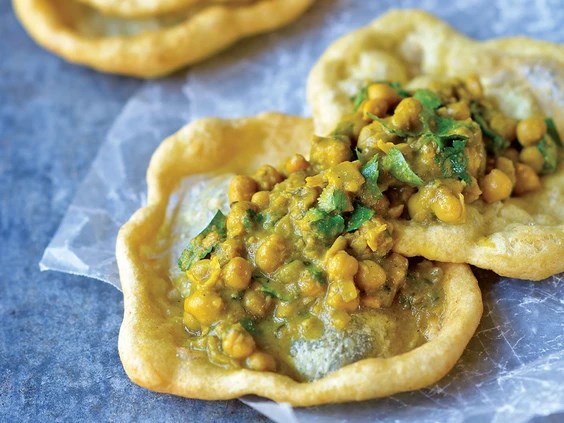Before Trinidad and Tobago gained independence in 1962, the Caribbean twin-island was ruled by France, Spain and the U.K. Throughout its colonization, there was substantial reliance on the labour of West African, Indian, Chinese and Caribbean Indigenous peoples. Trinidadian food is entrenched in the age-old cuisines of these people.
In particular, tens of thousands of labourers from India landed between 1845 and 1917 seeking employment and an escape from poverty as indentured agricultural workers on British-owned plantations, so it’s quite natural that the cuisine became dominated by the Indian ancestry of a large portion of the local population.
This is where we start the story of doubles, the undisputed national dish of Trinidad. Some say that it’s possibly an adaptation of Indian chole bhature, made from a combination of spicy chickpea sauce called chana masala and fried bhatura bread, but doubles — never singular — has a rich history rooted in the island’s indentureship.
According to one of the most widely spread legends, the origin of these iconic snacks dates back to the 1930s when many Indian workers, once finally released from their indentured labour, set up stalls to sell the economical fried curried chana (chickpeas) wrapped in cone-shaped paper in order to earn a living.
One such family was Emamool 'Mamoo' or 'Mamudeen' and Rasulan Deen, direct descendants of these workers. They eventually stepped up their dry chana by introducing a cooked or wet variety, scented with garlic and onion, curry powder and cumin, and accompanied it with a single bara — a sort of round and fluffy flatbread. Placing the chana on top of the bara was the first stroke of genius. Eventually Mamoo’s customers asked him to ‘make it a double’ by adding a second bara over the chana. Thus the doubles we know today were born.
This low-cost, high-protein, nutritious, vegan street food is beloved by everyone. Satisfying and somewhat addictive, doubles can be found along the roads throughout Trinidad, at stalls or sold out of a box by many vendors on bicycles. They are most often eaten for breakfast but are also popular any time of day. Doubles for breakfast is a given. Doubles for lunch, dinner and even a late night snack are always within reach. Pepper sauce, culantro or shadon beni, mango pickle, and tamarind are the usual condiments of choice.
Doubles are culturally significant outside of Trinidad as a comfort food for expatriate Trinidadians too.
Three such beautiful people can be found at 45 Cork St. E. in Downtown Guelph. Family owned and operated by Lorenza, Lochan and Loretta, Guelph Caribbean Cuisine has been serving authentic Trinidadian dishes since 2008 with a true taste of Trinidadian street food — doubles, traditionally made roti and curry with their own special blend of fresh seasonings and pepper sauce. Everything is made in house from scratch, with heart and honouring ancient traditions. It’s a place where you’ll find some of the best bara which, when done right, are slightly crispy on the outside and soft in the middle, just like Lorenza makes.



